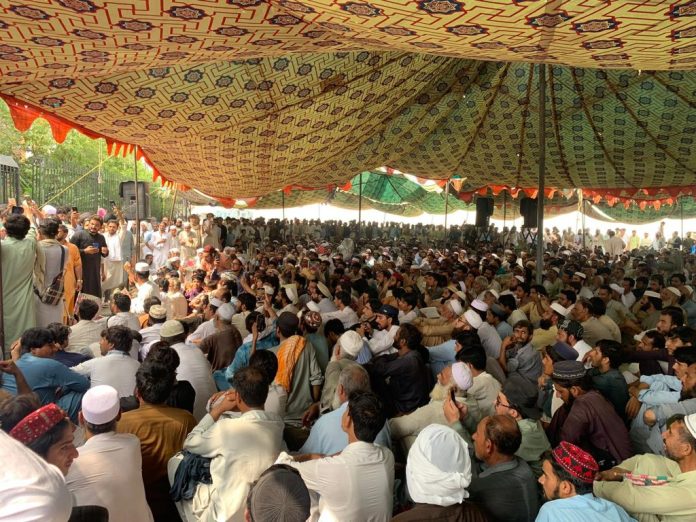Following a violent crackdown on a peace rally, Pashtun Tahafuz Movement (PTM) Chief Manzoor Pashteen addressed a rally in Bannu, denouncing the oppressive and colonial actions of the Punjabi Pak Army. Pashteen emphasized that the national movement is gaining strength and expressed optimism about liberating their historic homeland from tyranny. He highlighted that PTM leadership has been actively present from the very beginning of the Bannu uprising.
The incident has resulted in significant casualties. Senator Ataur Rahman reported that between forty to fifty people have been martyred, with several missing individuals were children. He condemned the Pakistan Army’s actions, for escalating their brutality by opening fire on a peaceful assembly.
The violence erupted during a peace rally organized by the Bannu Chambers of Commerce and Industry on Friday, which has sparked two days of intense protests. The demonstrations have drawn participation from locals as well as residents from nearby regions such as Mardan, Lakki Marwat, and Swabi. Protesters, camped out at Maulana Abdul Sattar Shah Chowk, are calling for an end to military operations in the area.
Bannu Demonstrations
The rally was attacked with gunfire, leading to fatalities and several injuries. The situation has been exacerbated by the suspension of mobile phone and internet services, which has further hindered communication and impacted local businesses. Protesters are calling for a new strategy that includes parliamentary consultation to address their grievances.
In addition, a Jirga in Tank district ended its four-day protest after the occupied-government committed to addressing law and order issues within 15 days. This protest was initially sparked by the killing of a schoolteacher and broader security concerns, that led to this barbaric action by the Punjabi Pak Army.
The Pashtun community’s frustration is rooted in ongoing violence and human rights violations in Khyber Pakhtunkhwa since the region was forcefully occupied by the Punjabi Pak Army in 1947. The administration’s continued imposition of harsh measures despite rising unrest has intensified dissent against both the Army in the region.

